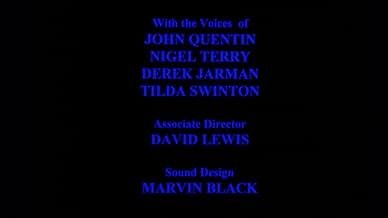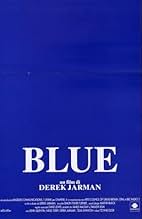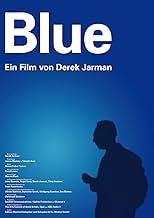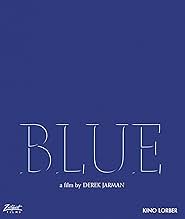In his final - and most daring - cinematic statement, Jarman the romantic meets Jarman the iconoclast in a lush soundscape pulsing against a purely blue screen, laying bare his physical and ... Read allIn his final - and most daring - cinematic statement, Jarman the romantic meets Jarman the iconoclast in a lush soundscape pulsing against a purely blue screen, laying bare his physical and spiritual state.In his final - and most daring - cinematic statement, Jarman the romantic meets Jarman the iconoclast in a lush soundscape pulsing against a purely blue screen, laying bare his physical and spiritual state.
- Awards
- 2 wins & 1 nomination total
Derek Jarman
- Self
- (voice)
- …
Tilda Swinton
- Narrator
- (voice)
John Quentin
- Narrator
- (voice)
Nigel Terry
- Narrator
- (voice)
- Director
- Writer
- All cast & crew
- Production, box office & more at IMDbPro
Featured reviews
Jarman's "Blue," a feature consisting entirely of a blue screen with voice-overs, has succeeded in annoying viewers with its seemingly uninventive approach to the cinematic personal narative. As so much of what we have come to consider "good" filmaking relies primarily on our sense of sight and our ability to absorb and process hundreds of CGI critters flashing before our eyes, it is easy to forget that a "good film" relies as much if not more so on the story than it does on the visuals.
Jarman's story is one that does not need visuals to support it. Reflecting upon his life in the face of his rapidly approaching death, Jarman's memories and meditations offer the viewer (listener, really) a window into the soul of a director who is losing the most important sense he could posses: his sight. Blue was the last color available to him before AIDS related complications robbed him of his sight. As he stands before death and stares it straight in the face, Jarman's writings put forth a suprising feeling of calmness, as he has accepted his own finitude and shares his meditations with us in this, his last masterpiece.
Jarman's story is one that does not need visuals to support it. Reflecting upon his life in the face of his rapidly approaching death, Jarman's memories and meditations offer the viewer (listener, really) a window into the soul of a director who is losing the most important sense he could posses: his sight. Blue was the last color available to him before AIDS related complications robbed him of his sight. As he stands before death and stares it straight in the face, Jarman's writings put forth a suprising feeling of calmness, as he has accepted his own finitude and shares his meditations with us in this, his last masterpiece.
There is nothing I can write here that hasn't been written before about this film. A masterpiece. A seemingly 'dull' film. A brave and courageous final farewell from a great man.
Art for Arts Sake? Ars Gratia Artis? No. Absolutely not. This is a film made by a dying man while practically on his deathbed. His sight robbed of him, what more could an experimental film-maker do?
A powerful script telling of his life ('I'm sitting in a cafe....'), the things around him (the cyclist who nearly knocks him over to then hurl abuse at him), his lifestyle (I am a cock sucking straight acting lesbian man, I am a not-gay).
Jarman's Voice Over is the most provocative text about one's own death I know of. Of course, he knew he was dying. His doctors told him he was dying. He goes into graphic details of his medications, his symptoms, his pains. Never again can a film maker describe their own death in such a way, Jarman has done it and done it brilliantly.
The Blueness also plays a part. After a few minutes I felt angry, annoyed at having to stare at a screen of blue. I tried looking at the floor, closing my eyes, anything to avoid the blue. But I kept looking back.
A Masterpiece. Simple as that.
Art for Arts Sake? Ars Gratia Artis? No. Absolutely not. This is a film made by a dying man while practically on his deathbed. His sight robbed of him, what more could an experimental film-maker do?
A powerful script telling of his life ('I'm sitting in a cafe....'), the things around him (the cyclist who nearly knocks him over to then hurl abuse at him), his lifestyle (I am a cock sucking straight acting lesbian man, I am a not-gay).
Jarman's Voice Over is the most provocative text about one's own death I know of. Of course, he knew he was dying. His doctors told him he was dying. He goes into graphic details of his medications, his symptoms, his pains. Never again can a film maker describe their own death in such a way, Jarman has done it and done it brilliantly.
The Blueness also plays a part. After a few minutes I felt angry, annoyed at having to stare at a screen of blue. I tried looking at the floor, closing my eyes, anything to avoid the blue. But I kept looking back.
A Masterpiece. Simple as that.
Derek Jarman's "Blue" is amazing. the blue screen amplifies the sad and vivid sound-track. at times fast, at times slow. Jarman's dark sense of humor peaks out every now and then. very hard to watch the whole movie with out a break. a great sound-track for a long drive in the car.
Blue had the prestige to be the first film to be shown on television and broadcast on radio at the same time, something not likely to be challenged for a long time. Naturally this doesn't make it a good movie, and if you think the films blue screen is a gimmick then you'll probably feel the same about this, however, you'd be wrong.
Pretentious? Well, i think an hour and a half of blue screen by anyone who wasn't going blind at the time would be pretentious, with Blue he was operating within his capabilities, and at the same time giving the viewer an appreciation of what it is to be blind. You think an hour and a half of this is irritating, well I presume Jarman thought that too. Watching the blue screen isn't meant to be fun, but it certainly helps draw attention to what is being said, which is the most important part of all. There was no blue screen when aired on the radio, so you could even argue its superficiality on that point. Once you get over the fact that Jarman has robbed you of anything visual, then can you truly appreciate a very honest piece of work by a talented man
Pretentious? Well, i think an hour and a half of blue screen by anyone who wasn't going blind at the time would be pretentious, with Blue he was operating within his capabilities, and at the same time giving the viewer an appreciation of what it is to be blind. You think an hour and a half of this is irritating, well I presume Jarman thought that too. Watching the blue screen isn't meant to be fun, but it certainly helps draw attention to what is being said, which is the most important part of all. There was no blue screen when aired on the radio, so you could even argue its superficiality on that point. Once you get over the fact that Jarman has robbed you of anything visual, then can you truly appreciate a very honest piece of work by a talented man
Derek Jarman's final work is perhaps his most unusual. The visuals are nothing but a solid screen of bright blue. The soundtrack is a montage of sound effects, voice overs, and music. The dialogue is Derek Jarman's coming to terms with himself, and his terminal illness.
Some will find the whole affair a pretentious bore. Others will find it a moving farewell from a groundbreaking British film-maker who was completely blind by the time the film was completed. He broke the rules, especially with this film, and it's probably how he wanted to be remembered.
Some will find the whole affair a pretentious bore. Others will find it a moving farewell from a groundbreaking British film-maker who was completely blind by the time the film was completed. He broke the rules, especially with this film, and it's probably how he wanted to be remembered.
Did you know
- TriviaDerek Jarman went completely blind as a side effect of AIDS which is why this film is audio based. He died the year after its production.
- Quotes
Terry, Nigel: We've always been mistreated and the moment anyone gives us the slightest bit of attention we over-react with our thanks.
- ConnectionsFeatured in Derek Jarman: Life as Art (2004)
- How long is Blue?Powered by Alexa
Details
- Release date
- Countries of origin
- Official site
- Language
- Also known as
- Derek Jarman's Blue
- Production companies
- See more company credits at IMDbPro
Box office
- Budget
- £90,000 (estimated)
- Runtime1 hour 19 minutes
- Sound mix
- Aspect ratio
- 1.85 : 1
Contribute to this page
Suggest an edit or add missing content

























